Key takeaways:
- Disturbing headlines evoke strong emotional responses, prompting deeper reflection on societal issues and personal vulnerabilities.
- The news media shapes public perception and can influence emotional well-being, necessitating mindful consumption and critical engagement.
- Practicing emotional management techniques, such as setting boundaries and discussing feelings with others, can help mitigate the impact of distressing news.
- Sharing insights and engaging in open dialogues fosters understanding and emotional support, transforming perceptions of disturbing headlines.
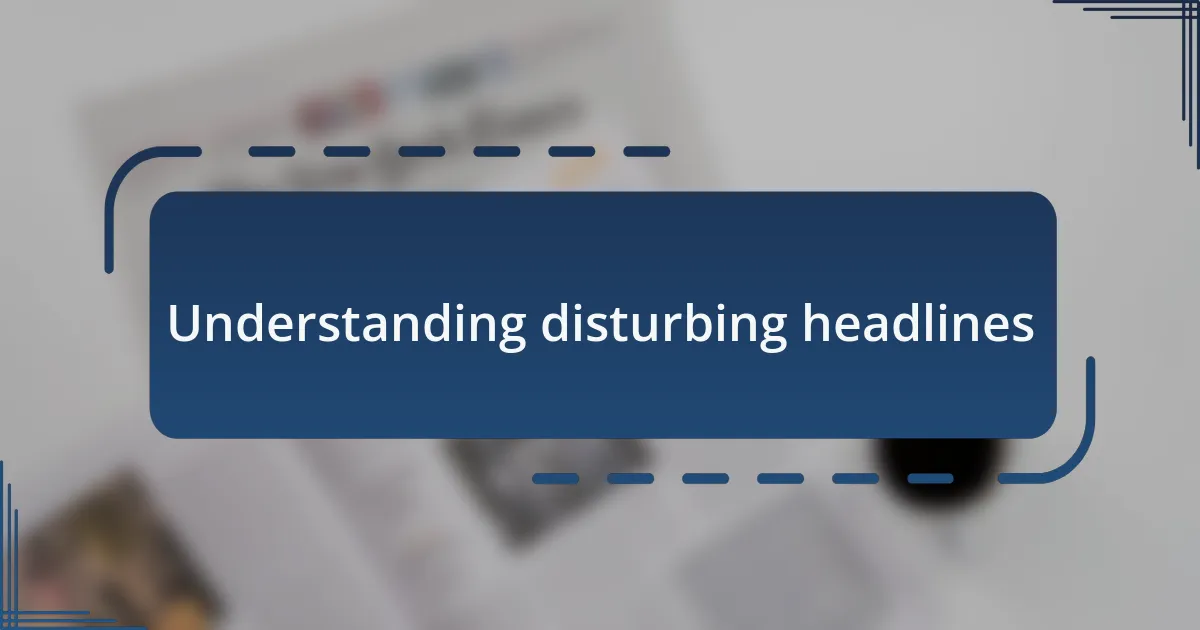
Understanding disturbing headlines
Disturbing headlines often grab our attention because they tap into our emotions, whether it’s fear, sadness, or anger. I remember reading a headline that described a tragic incident, and it left me feeling unsettled for days. It made me wonder: why do certain stories resonate so deeply with us, even when they’re painful to confront?
The language used in these headlines is often designed to provoke a strong reaction. For instance, phrases like “shocking” or “heartbreaking” set a specific tone, inviting readers to engage on a visceral level. I’ve found that pausing to reflect on my own reaction helps me navigate these feelings. Why does a particular story disturb me? Understanding my emotional responses often reveals vulnerabilities I didn’t even know I had.
Moreover, I’ve noticed that disturbing headlines can become a mirror reflecting societal issues. When I read about a crime wave in a community, it raises questions about safety and justice that often go unexamined. How can we address the roots of such problems if we only focus on the sensational aspects? By pushing past the initial shock, we can engage in deeper conversations about what these stories reveal about our world.
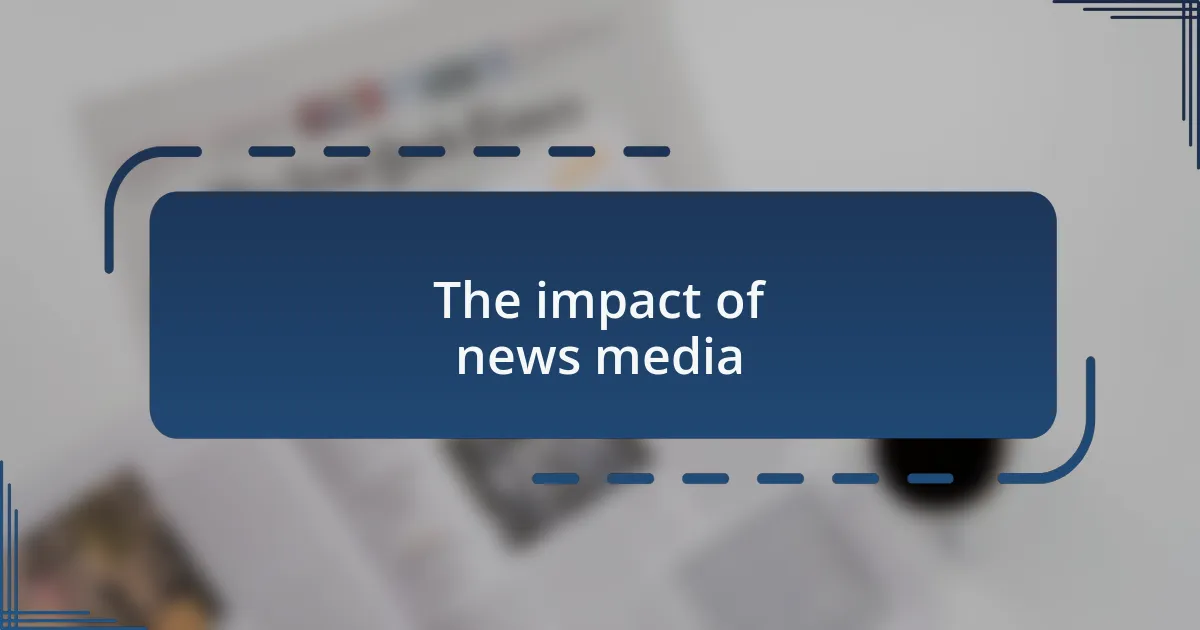
The impact of news media
The news media plays a pivotal role in shaping our perceptions of reality. I recall seeing a report about a local incident that spiraled into a nationwide debate. It struck me how a single story could influence opinions and drive conversations across the country. Isn’t it fascinating how the media has the power to elevate certain issues while ignoring others?
When I reflect on the impact of news media, I often think about how it can foster a sense of community or isolation. For example, during the pandemic, I found solace in stories that highlighted acts of kindness. However, the constant barrage of distressing headlines sometimes felt overwhelming, as if we were living in a perpetual state of fear. How do we balance our need for information with our mental well-being amidst such chaos?
It’s also important to consider how the way we consume news affects our emotional landscape. I’ve noticed that scrolling through headlines late at night leaves me restless, often replaying those stories in my mind. This experience makes me question whether we’re truly processing the information or simply numbing ourselves to the horror. How can we find healthier ways to engage with news that respect our emotional limits while still addressing pressing issues?
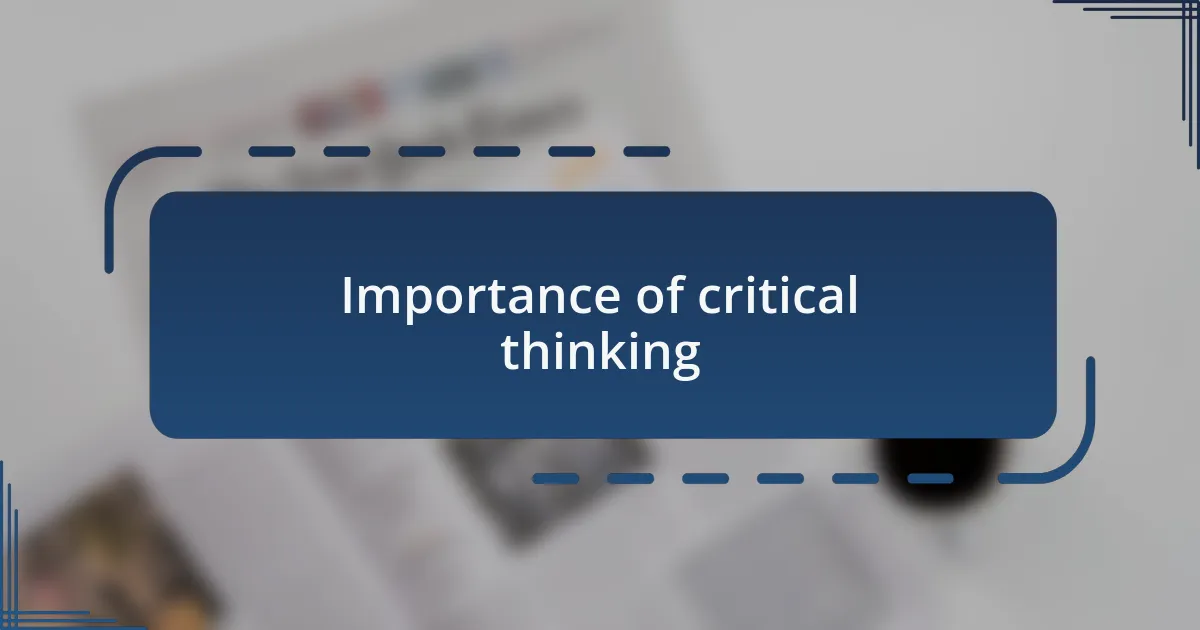
Importance of critical thinking
When I think about critical thinking, I recognize it as an essential skill in navigating the complex landscape of news media. I’ve often found myself questioning the motivations behind certain headlines. For instance, when a sensational story emerges, I ask myself: who benefits from this narrative? This approach not only aids in my understanding but also empowers me to sift through the noise of misinformation.
It can be surprisingly easy to take headlines at face value, but I’ve learned that pausing to analyze what I read can be illuminating. I once reacted impulsively to a shocking report, only to later discover it was based on distorted facts. This experience taught me the value of verifying sources and checking multiple perspectives. Have you ever felt misled by a news story that turned out to be less impactful than initially portrayed?
Engaging critically with news isn’t just about skepticism; it’s about fostering a deeper connection to the information. I often jot down my thoughts after reading a troubling article, reflecting on how it relates to my own life. This practice not only helps me process my emotions but also sharpens my ability to discern what truly matters. How does your interaction with news shape your viewpoint, and have you thought about how critical thinking can transform that process?
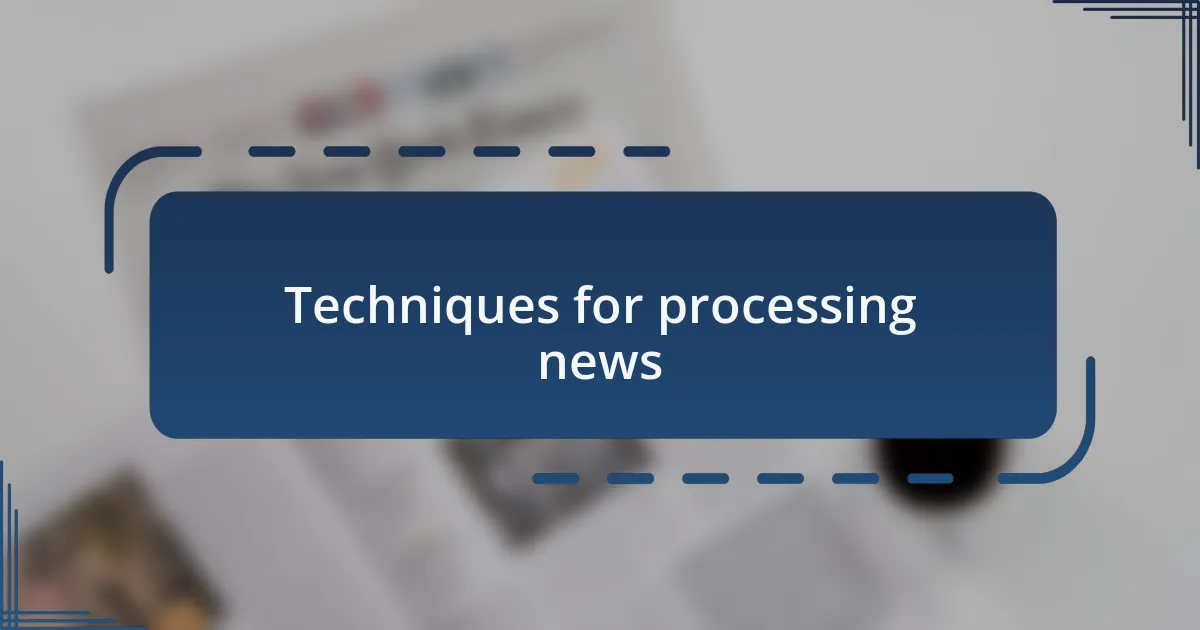
Techniques for processing news
One technique I’ve found invaluable is to take a step back and breathe before reacting to alarming news. I remember reading a headline about a potential public crisis that sent my mind racing. Instead of jumping into a frenzy, I took a moment to gather my thoughts and assess the situation more calmly. This pause allowed me to think more clearly, and ultimately, I realized that the reality wasn’t as dire as it appeared at first glance.
Another method I employ is to seek diverse viewpoints on the same news story. I often turn to different news outlets to see how various editorial slants interpret the same events. For instance, during a politically charged event, I compared responses from both mainstream and alternative media. This comparative analysis not only broadened my understanding but also revealed biases that I might have missed otherwise. Have you ever noticed how your perspective shifts when you consider multiple angles?
In addition, I frequently keep a digital journal where I outline my reactions to provocative headlines. After I reflect on how these stories resonate with my experiences, I feel a sense of clarity. This approach acts as an emotional outlet, and it helps me untangle my initial feelings while fostering a healthier relationship with the news. How do you process your emotional responses to the stories you encounter?
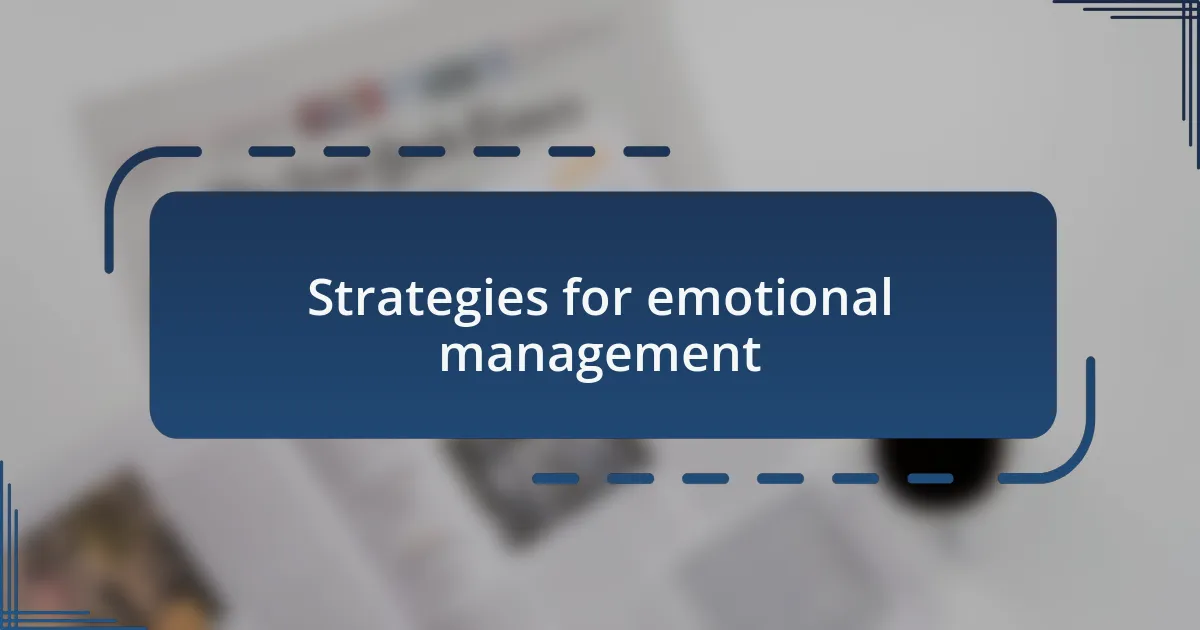
Strategies for emotional management
One effective strategy I’ve adopted for emotional management is creating boundaries around my news consumption. I recall a time when constant exposure to distressing headlines left me feeling drained and anxious. By limiting my news intake to specific times of the day, I found that I could engage with the stories without being overwhelmed. Do you ever feel more in control when you set boundaries for yourself?
Moreover, practicing mindfulness techniques has proven to be a game changer for me. When I feel the weight of disturbing news pressing down, I take a moment to sit quietly and focus on my breath. This simple act of grounding brings me back into the present and helps me distance myself from the chaos of the headlines. Isn’t it amazing how just a few deep breaths can shift your emotional state?
Lastly, I often find solace in discussing my feelings with friends and family. After hearing a particularly unsettling news story, I reach out to loved ones to share my worries. This exchange not only fosters connection but also provides me with different perspectives and emotional support. Have you considered how open conversations can transform your experience of consuming news?
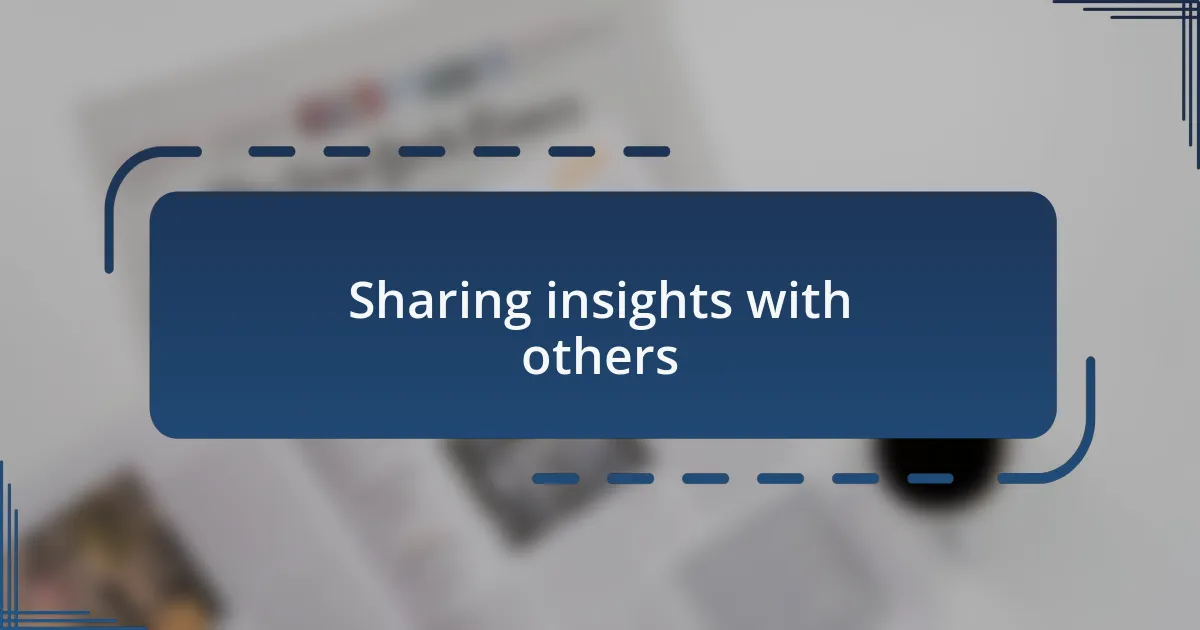
Sharing insights with others
Sharing insights with others can be incredibly powerful, especially when it comes to processing disturbing headlines. I remember a time when a troubling story about violence in my community left me feeling unsettled. Reaching out to a close friend helped clarify my thoughts; we ended up exploring how news affects our emotions and perceptions of safety. Have you ever felt lighter after talking things out with someone?
In my experience, these conversations often lead to unexpected revelations. While discussing this news, my friend shared a similar encounter that redefined my perspective on fear. It’s fascinating how our unique stories create a tapestry of understanding, helping us navigate uncomfortable emotions together. Isn’t it comforting to know that others share our concerns and can offer diverse viewpoints?
I also believe that creating spaces for open dialogues about news can foster deeper connections. Sometimes, I organize casual meet-ups where friends and colleagues can share their thoughts on current events. These settings invite honesty and allow for empathy, transforming the narrative from overwhelming to manageable. How do you think discussions could alter the way you perceive distressing headlines?
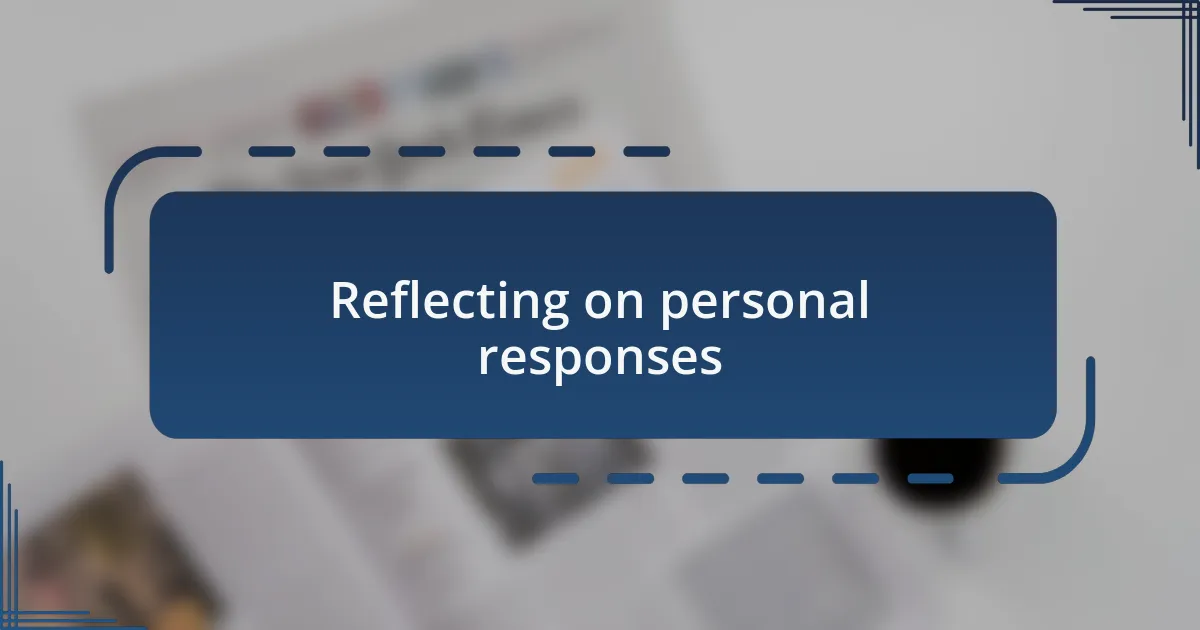
Reflecting on personal responses
When reflecting on my personal responses to distressing headlines, I often feel a surge of emotions that can be hard to unpack. I recall a time when I saw news about a tragedy that struck a family not far from where I live, and it hit me more deeply than I expected. It forced me to confront my own fears about the safety of my loved ones—every headline seemed to echo back to my own life. Have you ever found yourself questioning your own security in the wake of such stories?
I also notice that my initial reactions can be a blend of anger and sadness, followed by a desire to understand the “why.” After reading about social injustices, I sometimes take a step back and let that anger simmer before I engage in any discussions. It’s intriguing how letting those emotions breathe can lead to a more constructive dialogue; it shifts my focus from blame to solution. How do you process these initial feelings before diving deeper into the context?
Furthermore, I find that my reactions can vary based on the headline’s distance from my reality. Sometimes, a headline feels distant and easy to dismiss; at other moments, it can feel like a personal attack on my community and values. I often ask myself how my immediate circle is affected by the news I consume. That reflection helps ground me and convert frustrations into meaningful conversations that can contribute to positive change. What responses do you feel when a headline hits too close to home?